NBAA-BACE Experts Discuss How to Achieve Decarbonization

Oct. 18, 2022
Four industry and government leaders shared their thoughts Tuesday at the 2022 NBAA Business Aviation Convention & Exhibition (NBAA-BACE) in Orlando, FL, on how to advance decarbonization across all aviation sectors, including business aviation.
Decarbonizing aviation “is a problem of extraordinary scale,” said panelist Erik Lindbergh, a long-time environmental advocate who chairs the Lindbergh Foundation. “I think the interesting thing is that aviation is really motivated to solve this issue.”
The panel, moderated by aviation journalist Miles O’Brien, discussed reducing the use of fossil fuels through a combination of strategies, including sustainable aviation fuel (SAF), more efficient operations and, in the long term, utilizing emerging electric and hydrogen propulsion technologies.
The talk drilled deep into what strategies – including regulation and prizes for developing technological breakthroughs – would effectively incentivize the industry to push forward.
“We need incentives,” said Lindbergh, who mentioned using prizes like the one his grandfather received after his famed 1927 Atlantic crossing. “Competition is good. We also need early adopters. Government can play a role in that.”
Panelist Rep. Rick Larsen (D-2-WA) said legislation might offer more powerful incentives. The 2022 Inflation Reduction Act and its blenders tax credit for SAF producers “probably doesn’t live long enough” and is “probably not big enough right now, but it is what we can do.”
“The tax incentive side to take advantage of what the market can do is something we should be thinking hard about,” Larsen said. “I think the next steps for us in Congress are [determining] what investments we need to make at the federal level.”
“It’s just a chicken and egg problem,” said panelist Jaiwan Shin, CEO of Hyundai subsidiary Supernal, which is developing an electric vertical takeoff and landing (eVTOL) aircraft. “In a country like ours it’s an economically viable solution that you can’t do through regulation only.”
Supernal’s aircraft is designed to be a zero-emissions air taxi that would make short flights over gridlocked urban areas. The company expects to receive certification in time for its aircraft to enter service by 2028.
Although aircraft powered by hydrogen fuel cells and electric batteries are being developed, Larsen reminded the audience that much of the success of these new platforms hinges on public perception. “People need to know it’s safe.”
Another way to advance sustainability is to make operations more efficient. Amanda Simpson, vice president of research and technology at Airbus Americas, said, “We think there is an 8-10% [reduction in burning fossil fuels] we can still get on the operations side.” These efficiencies include using robotic electric tugs and other ideas “that could make a difference.”
Shortly before the discussion began, NBAA President and CEO Ed Bolen announced business aircraft operators that have recently received accreditation under NBAA’s Sustainable Flight Department Accreditation Program: Netflix, Mente, Steelcase, Cessna/Beechcraft and Monarch Air Group. The new program aims to promote a sustainability culture in the business aviation community.
Ultimately, Shin said, “We have to be serious that we’re going to lead the world and show how we’re going to work together.”
Review details about NBAA’s Sustainable Flight Department Accreditation Program.
Any person who attends an NBAA convention, conference, seminar or other program grants permission to NBAA, its employees and agents (collectively "NBAA") to record his or her visual/audio images, including, but not limited to, photographs, digital images, voices, sound or video recordings, audio clips, or accompanying written descriptions, and, without notifying such person, to use his or her name and such images for any purpose of NBAA, including advertisements for NBAA and its programs.
Related Articles
February 27, 2024
NBAA, Industry Partners Oppose California Efforts to Regulate Jet Fuel
December 15, 2023
NBAA Welcomes Decision from Treasury on Sustainable Aviation Fuel Tax Credit; Eager for Remaining Guidance
Nov/Dec 2023
Management: No SAF at the FBO? Try Book-and-Claim
November 13, 2023


 International Business Aviation Council Ltd.
International Business Aviation Council Ltd.